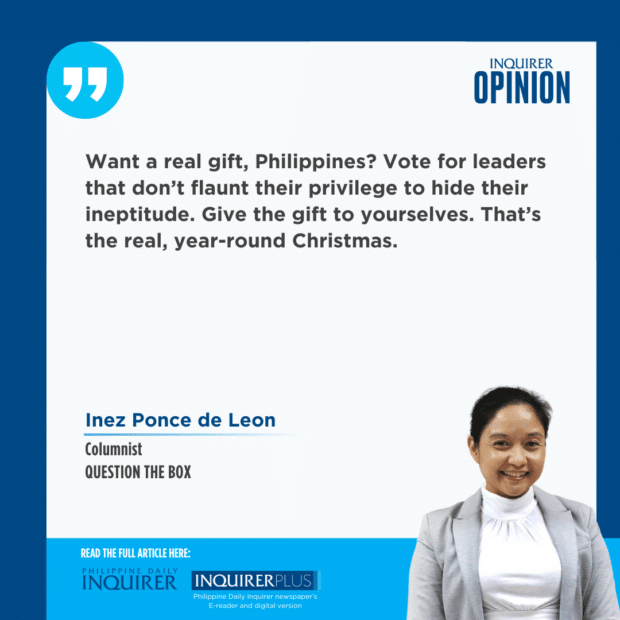Pretending to be a savior

The last Christmas holiday was awash in political ads. The Commission on Elections and the candidates can make all the excuses and employ all the spin doctors they want, but the ads were all campaigning, all annoying.
Political ads contain within them a candidate’s personality; but if we look deeper, we also find that political ads also tell us what a candidate thinks about the Filipino people.
Take the ads in the last presidential election, where Filipinos were told to unite. Yes, there are deep lines of regionalism running through our everyday discourses, and many Filipinos are preoccupied with ensuring their personal gain even at the expense of others’ welfare. We are an individualistic people fantasizing about a “bayanihan” spirit.
The ads told us that the candidates see our division as mere childish play that can be cured by ordering people to move on from their past without reflection, to think only of working toward a common goal without knowing who we are, to just do as we are told.
The ads reflected the perceptions of candidates, who saw people as misguided children to be ordered about. The ads infantilized voters, turned them into helpless babies that needed discipline.
What was the nature of that prescribed unity? There was no explanation, but it was an attractive buzzword to those who perceived the country as divided along lines that voters could not explain themselves.
The problem with the abstract ads is that they also smacked of abstract governance, and we are paying for that absent, disorganized governance today.
Now take this more recent ad, the Santa-Wannabe, also Senator-Wannabe making lame jokes about Santa’s potbelly and reindeer, before likening himself to Santa, except with more gifts all year round. His ad ended with a call for everyone to be Santa to each other, with what looked and sounded like canned cheering, as though giving gifts were a supposed asset for his candidacy—as though Christmas were merely about handing gifts out.
Haphazard appraisal would say that the ad shows a rich but generous candidate. Deeper reading shows that the candidate thinks of Filipinos as spoiled children: the kind that demand gifts, need only be given gifts to shut them up, will be happy with being given gifts in lieu of actual governance that must include writing laws and working in hearings in aid of legislation.
The ad also betrays the kind of leadership that the leader wants: a top-down behemoth where people are expected to obey, unite, and fall in line because they should be grateful for the gifts thrown their way. Because what is poverty to a rich, undiscerning man, but a scourge that can be rid of only by money—instead of understanding, acknowledging, and working against the forces that keep the poor in dire straits?
There seems to be no attempt to fix social safety nets and services, no strategy to create jobs that are sustainable rather than trendy and driven entirely by the demands of a volatile market, no effort at inspiring people to work together to uplift themselves.
In merely promising to give gifts, such leaders put people in indentured intellectual and social servitude, all in the guise of generosity.
I remembered the ad as I attended Mass last Sunday. The celebrant, our parish priest, Fr. Herbie Santos, talked about the Wise Men and their journey as a lens through which we could view the shortcomings of the Philippines.
For instance, the Wise Men still went in search of the Messiah even if King Herod did not help them. We can move forward faster, Father Herbie said, if we work instead of waiting for our leaders to act.
And we can move forward faster, too, he added, if we stop thinking of our needs as individuals and families, and focus on the community. There is too much focus on the individual, he said, as evidenced by donations and infrastructure that would always bear the name of a lawmaker, even if the donations and infrastructure are paid for by our taxes.
“Wouldn’t it be great if we had buildings, bridges, or birthday cakes with the label, ‘Brought to you by the Philippines’?” Father Herbie asked the congregation. “Maybe we’d start loving our country more, instead of being loyal and grateful to individuals.”
The ad, I realized, bothered me precisely because it encouraged top-down governance, where a single leader is expected to do a job that should be carried out through the efforts of many, that has already been paid for by the taxes of many.
The ad also painted a rosy picture of the difficult task of governance, the same way that Santa provides a shiny veneer of Christmas. Christmas isn’t just about gifts; it’s about one man’s birth into a life of poverty, in a world of war and unrest—so that we realize that leadership does not hinge on how one silences the poor, but how one must first be with the poor in order to understand them.
Want a real gift, Philippines?
Vote for leaders that don’t flaunt their privilege to hide their ineptitude.
Give the gift to yourselves. That’s the real, year-round Christmas.
—————-
iponcedeleon@ateneo.edu




















